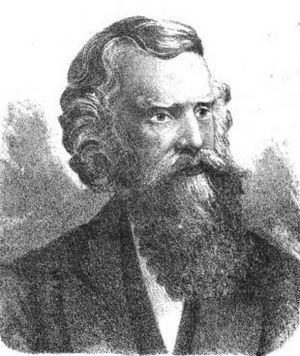Charles Anderson (governor) facts for kids
Quick facts for kids
Charles Anderson
|
|
|---|---|
 |
|
| 27th Governor of Ohio | |
| In office August 29, 1865 – January 8, 1866 |
|
| Preceded by | John Brough |
| Succeeded by | Jacob Dolson Cox |
| 7th Lieutenant Governor of Ohio | |
| In office January 11, 1864 – August 29, 1865 |
|
| Governor | John Brough |
| Preceded by | Benjamin Stanton |
| Succeeded by | Andrew McBurney |
| Member of the Ohio Senate from the Montgomery & Warren Counties district |
|
| In office December 2, 1844 – December 6, 1846 |
|
| Preceded by | Joseph Barnett |
| Succeeded by | John Hopkins |
| Personal details | |
| Born | June 1, 1814 Louisville, Kentucky |
| Died | September 2, 1895 (aged 81) Kuttawa, Kentucky |
| Political party | Republican Whig |
| Children | Sam Anderson |
| Alma mater | Miami University |
| Military service | |
| Allegiance | |
| Branch/service | |
| Years of service | August 9, 1862 - February 21, 1863 |
| Rank | |
| Unit | |
Charles Anderson (born June 1, 1814 – died September 2, 1895) was an American politician. He was a member of the Whig Party and later the Republican Party. He served as the 27th Governor of Ohio for a short time.
Contents
Charles Anderson's Life
Early Years and Education
Charles Anderson was born in Louisville, Kentucky. His family was well-known. His father, Richard Clough Anderson Sr., helped the Marquis de Lafayette during the American Revolution.
Charles Anderson went to Miami University and graduated in 1833. After college, he studied law. He then became a lawyer in Ohio. He moved to Dayton, Ohio, where he started his law practice. Later, he was chosen to be the county prosecutor.
Standing Up for Rights
In 1844, Anderson was elected to the Ohio Senate. He became known for supporting equal rights for Black people. Later, he moved to Texas because of his health.
In December 1860, he gave a strong speech in San Antonio. He spoke against states leaving the Union. He called for the country to stay together. People who supported the Confederates were angry. They threatened Anderson and arrested him. But Anderson managed to escape. He returned to Dayton with his family.
Serving in the Military
President Abraham Lincoln asked Anderson to travel to Europe. His job was to speak about supporting the Union. After this, Anderson joined the Union Army. He became a colonel and led the 93rd Ohio Infantry.
Anderson was hurt during the Battle of Stones River. Because of his injuries, he left the army. He went back to Ohio to get better.
Becoming Governor
In late 1863, Anderson was elected the seventh Lieutenant Governor of Ohio. He started this job the next year. On August 29, 1865, he became governor. This happened after Governor John Brough passed away.
Anderson was governor for less than five months. His term ended on January 8, 1866. A historian named Dwight L. Smith said his time as governor was "uneventful." This means he mostly handled regular tasks.
Later Years
After being governor, Anderson went back to being a lawyer. He moved back to Kentucky. He passed away there at the age of 81. He is buried at Kuttawa Cemetery in Kuttawa, Kentucky.
Family Connections
Charles Anderson had a famous brother named Robert Anderson. Robert was also an officer in the United States Army. He is known for defending Fort Sumter at the start of the American Civil War.
Another brother, William Marshall Anderson, was an explorer and politician.
 | Laphonza Butler |
 | Daisy Bates |
 | Elizabeth Piper Ensley |

